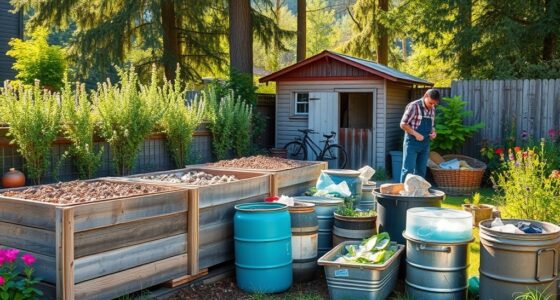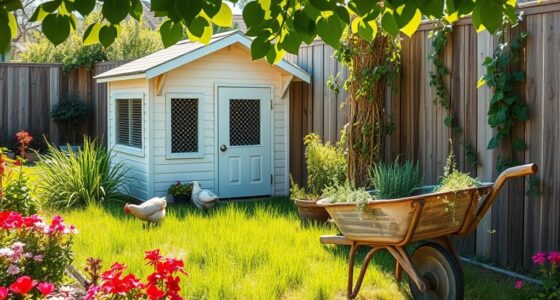When the power’s out, ensuring safe and effective off-grid cooking means choosing reliable heat sources like wood stoves, propane burners, or solar cookers, and always following safety precautions. Keep flammable materials away, have fire extinguishers nearby, and store fuels properly. Use stable surfaces and supervise children and pets around heat. Planning ahead with backups and understanding your equipment helps you cook safely and efficiently—continue to explore ways to stay prepared during outages.
Key Takeaways
- Use well-ventilated areas and keep fire safety equipment nearby when cooking with open flames or fires.
- Store fuel safely away from heat sources, and regularly inspect stoves and containers for leaks or damage.
- Choose stable, level surfaces for cooking setups to prevent accidents and ensure safety.
- Have backup cooking methods like solar cookers or portable stoves in case primary sources fail.
- Supervise children and pets around open flames and hot equipment, and follow safety protocols at all times.

Have you ever wondered how to cook effectively away from the grid? When the power’s out or you’re off the beaten path, traditional electric appliances become useless. That’s when knowing how to generate safe, reliable heat becomes vital. Off-grid cooking requires preparation and the right equipment to guarantee your meals are both delicious and safe to eat. First, it’s important to understand the different heat sources available. Wood-burning stoves or open fires are classic choices, providing consistent heat and the ability to cook a variety of dishes. If you have access to wood or other biomass, you can build a simple firepit or use a portable stove designed for outdoor use. Just remember, safety is paramount—always clear the area of flammable materials, have water or a fire extinguisher nearby, and never leave a fire unattended.
Another popular option is using propane or butane stoves. These are portable, easy to use, and can be quite efficient. They’re especially handy if you don’t want to deal with the mess or smoke of a wood fire. Make sure to store fuel safely, away from heat sources or direct sunlight, and check for leaks before igniting. If you’re looking for a more sustainable approach, solar cookers can be a fantastic addition to your off-grid toolkit. They harness the sun’s power, allowing you to cook during the day without any fuel. While their effectiveness depends on weather conditions and the time of day, they’re a clean, quiet, and safe way to prepare meals.
Use portable propane or butane stoves for efficient, mess-free off-grid cooking and consider solar cookers for a sustainable, fuel-free option.
Regardless of the heat source, safety remains a top priority. Always cook in well-ventilated areas to prevent the buildup of harmful fumes. Keep fire extinguishing tools nearby and ensure your cooking area is free of flammable debris. When using open flames, never leave them unattended, and always supervise children or pets in the vicinity. Also, consider the stability of your cooking setup—use sturdy surfaces to prevent accidents. Properly storing your fuel and managing your fire or stove prevents unintentional fires or leaks. Understanding space‑saving appliances and their safe operation can also improve your off-grid cooking experience, especially in limited spaces.
In all cases, planning ahead is vital. Keep your supplies organized, and have backup options available, especially if you rely heavily on a particular fuel source or device. Off-grid cooking isn’t just about improvisation; it’s about safety, efficiency, and making sure you can enjoy a warm meal even when the grid isn’t an option. With the right knowledge and precautions, you’ll be able to cook effectively and safely, no matter where you are.
Frequently Asked Questions
Can Off-Grid Cooking Methods Be Used Indoors Safely?
Yes, off-grid cooking methods can be used indoors safely if you follow proper precautions. You should use equipment specifically designed for indoor use, guarantee proper ventilation, and never leave the heat source unattended. Installing carbon monoxide detectors is essential to detect dangerous fumes. Always read and follow manufacturer instructions, and keep a fire extinguisher nearby. With these safety measures, you can cook indoors safely during power outages.
What Are the Environmental Impacts of Different Off-Grid Heat Sources?
You should consider that wood stoves emit particulates and carbon monoxide, affecting air quality and contributing to pollution. Propane and other fossil fuels release greenhouse gases, impacting climate change. Solar and wind-powered heating are cleaner options, producing minimal environmental harm. However, manufacturing and maintenance can have some impact. Overall, choosing renewable sources helps reduce your carbon footprint, but you should also think about local environmental conditions and sustainable practices.
How Do I Maintain and Clean Off-Grid Cooking Equipment?
You should regularly clean your off-grid cooking equipment to guarantee safety and efficiency. After each use, wash cookware with warm, soapy water and scrub away residue. For stoves or fire pits, remove ash and debris frequently to prevent blockages. Inspect for rust or damage, and replace parts as needed. Proper maintenance keeps your equipment in top shape, extends its lifespan, and ensures safe, effective cooking during power outages.
Are There Any Legal Restrictions on Using Certain Heat Sources?
You might think there are no restrictions on using certain heat sources, but in many areas, laws limit open flames or specific fuels due to fire safety concerns. Always check local regulations before setting up your off-grid cooking system. Some places ban wood stoves or require permits for propane use. Investigating these laws helps make certain you’re compliant and safe, preventing potential fines or hazards during your off-grid adventures.
How Can I Store Fuel Safely for Off-Grid Cooking?
You should store fuel in a cool, well-ventilated area away from heat sources or open flames. Keep containers tightly sealed to prevent leaks, and always use proper, approved containers for each fuel type. Regularly check for corrosion or damage, and store fuels separately if possible. Follow local regulations and manufacturer’s instructions to guarantee safety, and keep fire extinguishers nearby in case of emergencies.
Conclusion
When the power’s out, off-grid cooking keeps you safe and self-reliant. Imagine Sarah during a storm, using her solar oven to prepare dinner without relying on electricity. By knowing your options—like portable stoves or fire pits—you stay prepared and enjoy warm meals even when grid power fails. Embrace these methods so you’re always ready to cook safely, no matter the circumstances. Off-grid cooking isn’t just practical; it’s empowering in any emergency.










